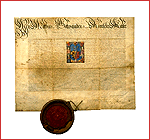 Since the first written code of law on the stele of Hammurabi (ca.1750 BCE), the effect of recording law has been to objectify it and to remove
it from the realm of easily forgotten verbal promises. Since the first written code of law on the stele of Hammurabi (ca.1750 BCE), the effect of recording law has been to objectify it and to remove
it from the realm of easily forgotten verbal promises.  Where the law
touches individuals--through documents such as passports, wills, birth certificates,
deeds, marriage licenses, and warrants--the rights and freedoms of those people are
protected at the same time as social control is exerted on them by the institution that
issues the paper. The written word, in this instance, has achieved a level of actual
authority, it can stand as proof or evidence. These documents, whether written or printed,
play a powerful role in most cultures precisely because they record legal status and
confer identity. Where the law
touches individuals--through documents such as passports, wills, birth certificates,
deeds, marriage licenses, and warrants--the rights and freedoms of those people are
protected at the same time as social control is exerted on them by the institution that
issues the paper. The written word, in this instance, has achieved a level of actual
authority, it can stand as proof or evidence. These documents, whether written or printed,
play a powerful role in most cultures precisely because they record legal status and
confer identity. |
